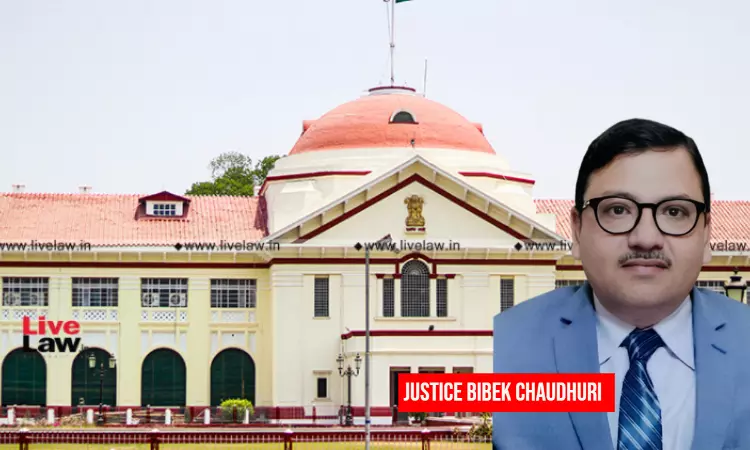- Home
- /
- High Courts
- /
- Patna High Court
- /
- Union Backed By Custom,...
Union Backed By Custom, Cohabitation & Birth Of Child Must Be Treated As Valid Marriage For Purposes Of S.125 CrPC: Patna HC
Sparsh Upadhyay
11 July 2025 11:30 AM IST
"Disregarding such a union would not only be legally unsound but would also send a regressive message to society, undermining the dignity of women and the security of children born from such relationships" : Patna High Court said.
The Patna High Court has observed that a marriage, when validated by custom, cohabitation, social acceptance, and the birth of children, must be treated as legally valid for the purposes of seeking maintenance under Section 125 CrPC. A bench of Justice Bibek Chaudhuri noted that disregarding such a union would not only be legally untenable but would also send a regressive message...
The Patna High Court has observed that a marriage, when validated by custom, cohabitation, social acceptance, and the birth of children, must be treated as legally valid for the purposes of seeking maintenance under Section 125 CrPC.
A bench of Justice Bibek Chaudhuri noted that disregarding such a union would not only be legally untenable but would also send a regressive message to society, undermining the dignity of women and the security of children born from such relationships.
The single judge added that a woman, having lived as wife, borne children, and been deserted without support, would fall within the protective umbrella of Section 125 CrPC, and in such cases, the technical plea of invalidity of marriage wouldn't be a valid ground to deny her maintenance
The single judge observed thus while allowing a criminal revision plea filed by the wife challenging a family court's order dismissing her maintenance claim under Section 125 Cr.P.C. on the ground that she was not the legally wedded wife of the respondent.
The petitioner, a pardanashin lady, claimed that she got married to the opposite party (O.P. No. 1) in June 2010, following the death of her first husband.
It was her case that this marriage was solemnised as per long-standing Hindu customs prevalent in their community (levirate marriage), which permitted her to marry the younger brother of her deceased husband and out of this union, two sons were born.
She alleged that the respondent, a constable in Bihar Police, abandoned her and the children six years ago and has since failed to provide any maintenance.
On the other hand, it was the case of the husband that the petitioner is in fact his brother's widow, and hence, the marriage, if any, falls within the prohibited degrees of relationship under Hindu Law and is void ab initio. On this basis, he sought dismissal of the petition.
Finding substance in the husband's contention, the family court dismissed the wife's plea. Challenging the same, she moved the HC.
At the outset, Justice Chaudhuri noted that the Family Court had failed to consider two crucial aspects involved in the case:
- that the proceedings under Section 125 Cr.P.C. do not require a declaration of the validity of marriage but only a prima facie showing of the marital relationship for the purpose of maintenance;
- that the plea of custom, particularly concerning kareva or levirate marriages, had been specifically raised and needed to be adjudicated upon rather than being dismissed outrightly.
The single judge noted that it is a settled position of law that in proceedings under Section 125 CrPC, strict proof of marriage is not necessary.
"…a person who has lived with the opposite party as wife, and where the relationship is accepted socially and within the family, may be granted maintenance even if the marriage is disputed, especially when children are born out of the said relationship and their welfare is at stake", the Court noted.
The High Court further observed:
"The glaring inconsistency in disowning the petitioner on the sole ground of the marriage being a levirate marriage, while accepting her children as part of the family, reflects not just a legal contradiction but a moral and social injustice".
Furthermore, the Court referred to Section 5(iv) of the Hindu Marriage Act, 1955, which permits marriages within prohibited degrees if supported by custom.
It emphasized that the petitioner's plea of custom had not only been specifically raised but also found reflection in the cohabitation, acknowledgement by family, and the birth and acceptance of children.
In this regard, the Bench referred to the Top Court's ruling in the case of Badri Prasad vs. Dy. Director of Consolidation 1978 to underscore that a long-standing cohabitation gives rise to a strong presumption of valid marriage, especially where society treats the couple as husband and wife.
Reverting to the facts of the case, the court noted that a custom of levirate marriage had not only been pleaded but was evident in practice-acknowledgment by the family, cohabitation, and parenthood.
Against this backdrop, taking exception to the dismissal of the wife's plea, the High Court strongly observed thus:
"The denial of the wife's status in this context is an unjust act disguised as a legal technicality, and if accepted, would set a dangerous precedent where a woman who has fulfilled the role of a wife and mother is discarded without remedy, solely due to patriarchal convenience".
Hence, allowing the criminal revision plea, the matter was remanded back to the Family Court with a direction to restore the maintenance petition and proceed in accordance with law.
Case title - Sangeeta Devi vs.Pawan Kumar Singh
Case Citation :
Click Here To Read/Download Order

